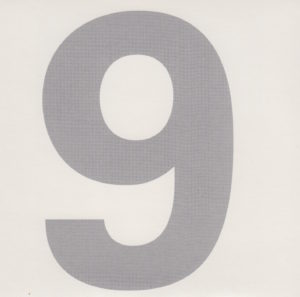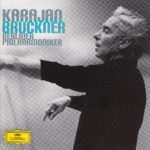 This morning’s conductor of Anton Bruckner’s unfinished Symphony No. 9 in D Minor WAB 109 (dedicated “to the beloved God”) is Austrian Herbert von Karajan (1908-1989), one of the most highly respected conductors – and interpreters of Anton Bruckner’s music – who ever lived.
This morning’s conductor of Anton Bruckner’s unfinished Symphony No. 9 in D Minor WAB 109 (dedicated “to the beloved God”) is Austrian Herbert von Karajan (1908-1989), one of the most highly respected conductors – and interpreters of Anton Bruckner’s music – who ever lived.
(By the way, the CD sleeve, left, reads “9” by coincidence, more than likely. The CD sleeve numbers and the symphony numbers don’t often match in this Karajan box set.)
I first encountered the Maestro on Day 8 of my 144-day journey, interpreting Bruckner’s First Symphony.
Then again on Day 24, Symphony No. 2.
Then again on Day 40, Symphony No. 3.
Then again on Day 56, Symphony No. 4.
Then again on Day 72, Symphony No. 5.
Then again on Day 88, Symphony No. 6.
Then again on Day 104, Symphony No. 7.
Then again, most recently, on Day 120, Symphony No. 8.
 I discovered that I love Bruckner’s Ninth. So I’ve been looking forward to hearing Karajan’s interpretation of it – not only because it’s Karajan, but also because the orchestra is the Berliner Philharmoniker and the box set is one released by Deutsche Grammophon, one of the most prestigious labels of Classical music in the world. DG does nothing sloppily.
I discovered that I love Bruckner’s Ninth. So I’ve been looking forward to hearing Karajan’s interpretation of it – not only because it’s Karajan, but also because the orchestra is the Berliner Philharmoniker and the box set is one released by Deutsche Grammophon, one of the most prestigious labels of Classical music in the world. DG does nothing sloppily.
So I’m expecting big things today.
But, enough of my waxing subjective. Let’s get all the facts first. Then I’ll provide my opinion about what I’m hearing.
Bruckner’s Symphony No. 9 in D Minor WAB 109, composed 1887-1896
Herbert von Karajan conducts
Karajan used (according to the liner notes) the “1896, edd. Orel, Nowak” (whatever that means), according to the liner notes
Berliner Philharmoniker plays
The symphony clocks in at 61:37
This was recorded in Berlin, Germany, in September of 1975
Karajan was 67 when he conducted it
Bruckner was 72 when he died before finishing the Ninth
This recording was released on the Deutsche Grammophon label
Bruckner wrote his symphonies in four parts. He would have this time, too. But he died before completing movement four. The time breakdown of this one (Symphony No. 9 in D Minor), from this particular conductor (Karajan) and this particular orchestra (Berliner Philharmoniker) is as follows:
I. Feierlich, misterioso (D minor)…………………………………………………………………24:54
II. Scherzo. Bewegt, lebhaft (D minor); Trio. Schnell (F-sharp major)……………………………………………………………………………………………………………10:37
II. Adagio. Langsam, feierlich (E major)……………………………………………………….25:51
IV. Finale. (D minor, incomplete)……………………………………………………………………0:00
Total running time: 61:37
Regarding the “Orel, Nowak” noted above, according to its entry on Wikipedia,
Orel edition (1932)
This was the first edition that attempted to reproduce what Bruckner actually wrote. This version was first performed in 1932 by Siegmund von Hausegger with the Munich Philharmonic Orchestra. In the concert, the symphony was performed twice, first in Löwe’s edition and then in the Orel version. It includes only the first three complete movements.
According to the notes on its entry on Wikipedia regarding the Nowak edition,
Nowak edition (1951)
This is a corrected reprint of the Orel edition of 1932.
From the excellent liner notes by Richard Osborne:
Bruckner never finished the Ninth Symphony; there is no finale. But it is not enough to say that he did not finish it because he died before completing it. What we have in the three completed movements…is Bruckner at his bravest and most despairing. It is impossible to say whether the psychosis that now clearly menaced him had purely private origins…or whether it mingled private anguish with an almost prophetic sense of the imminent crisis in the Austro-German musical culture.
Now, the subjective aspects.
My Rating:
Recording quality: 4
Overall musicianship: 4
CD liner notes: 5 (lengthy and informative, but very heavy on the Karajan worship)
How does this make me feel: 3
Overall, this was a fine performance of Bruckner’s Ninth.
It was solid. And well balanced.
It didn’t particularly move me, though.
Unfortunately, the Scherzo was just under stirring. It was extremely competent. Above average. But it didn’t want me to stand up and shout “Huzzah!” I was engrossed in the performance. But I wasn’t blown away by it.
I was, however, moved by the beauty and grandeur of the Adagio, especially the gentle, lilting final minute or two. That long horn note and the pizzicato are stunning.
A very fine performance, one I could recommend. Still, it wasn’t my favorite from what I’ve heard so far.
As for Richard Osborne’s notes, this is the first I’ve read of Bruckner’s psychosis. What is Osborne talking about? How do we know Bruckner was psychotic? I’ll have to research that.
I do get the “brave” and “despairing,” though. The Ninth is a terrifying piece of music.

You should try Karajan’s 1966 account on DGG (SLPM 139 011). I grew up with the 1975 performance you’ve reviewed here but, like you, it never really moved me..a bit too much of that Karajan legato. The 1966 performance is a lot more exciting. It’s slightly faster and leaner than the 1975 account which is a bit thick and syruppy by comparison. I sat wide-eyed with amazement when I first heard it. It was an exciting and refreshing change of pace to the older Karajan found on the later LP. You’ll like it.
Thank you, Alan.
I dug around on Amazon and found the CD version of the vinyl album you cited.
I’m going to buy it and give it a listen.
I’ve found Karajan to be an acquired taste that I’m still trying to acquire. I tried listening to his Beethoven symphonies from two cycles – 1963 and 1977, both considered his best. But I was only about half impressed with what I heard.
It may sound ridiculous to you and other true Classical music aficionados, but I fell in love with Leonard Bernstein’s conducting, and found him to be consistently superior to Karajan. Bernstein brought such unbridled passion and insight to his performances that I was carried along with him.
But I’m not going to give up on Karajan. I’ll keep trying to dig him.
And I’ll get a copy of this 1966 performance to start me on my way.